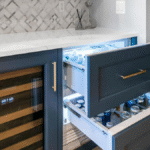Preparing different types of meals during family gatherings or for entertainment during holidays can be fun. However, kitchen safety should be your top priority since there are many environmental hazards and pieces of equipment that can cause injury. It is a good habit to observe the basic rules of kitchen safety while paying attention to what you are doing. Besides yourself, it is also important to be mindful of anyone within the vicinity especially if you have children in the house. In this article, we will be discussing ten new kitchen do’s and don’ts that you need to familiarize yourself with every time you are in the kitchen.
The Do’s
1. Do remember to wash your hands
Most people forget to wash their hands before and after cooking. The bacteria and germs present can cause food poisoning. Use soapy water to wash your hands and then dry them afterward using a paper towel. Using a dishtowel to wipe your hands dry contaminates the surfaces where you keep food.
2. Do stack your food carefully in the fridge
Most bacteria can be found in the refrigerator even when the temperatures are too low. It is easy to stick groceries anywhere you see fit when you run out of space because of an upcoming party. It is recommended to organize your food in different sections to prevent cross-contamination. Employ the same strategy in your shopping cart to prevent juices from fish, meat or poultry dripping on other foods.
3. Do use expiration dates as guidelines
The expiration dates on milk and food packages are meant to remind you that your food might not be at its peak quality after a certain period. However, consuming something immediately after the expiry date is a matter of quality rather than safety.
4. Do wipe up spills immediately
Keeping your kitchen floor dry prevents someone from slipping and falling. This can lead to secondary injuries from other items or fixtures in the kitchen. Spills on surfaces such as countertops or New Kitchen wall should be cleaned immediately to avoid stains and discoloration.
5. Do treat your knives with respect
Kitchen knives can be dangerous if not handled properly. They need to be cleaned and placed away from children after using. It is also important to walk with your knife pointed down to minimize the risk when interacting with your fellow cooks.
The Don’ts
6. Don’t use the same chopping board for vegetables, fruits, and raw meat
One of the areas where you should not take any shortcuts is your cutting board. Since we do not want to wash extra dishes, it might seem an easy task using the same chopping board but it increases the risk of cross-contamination. If it is a must that you should use the same cutting board, then you need to prepare vegetables and fruits first, wash it with hot water and soap before preparing raw meat.
7. Don’t wash poultry and raw meat
We tend to wash meat and poultry because we want them to be clean before cooking. This practice increases the chances of spreading harmful bacteria to other surfaces or food. Salmonella or E.coli is one of the common types of bacteria that can be spread to other surfaces after rinsing meat.
8. Don’t allow leftovers to cool down before placing them in the refrigerator.
Most people think that it is a bad idea to place hot food in the refrigerator. Allowing food to cool to room temperature gives it enough time to accumulate bacteria in the surroundings before it is refrigerated. Letting the food sit much longer outside makes it go bad quickly even after it has been placed in the refrigerator. If it hasn’t gone bad, then the quality of its taste will be compromised.
9. Don’t leave leftovers within reach of pets
Curious pets may want to sniff around or have some taste of your food if it is kept within accessible reach. If you are still eating, ensure that the dishes are completely covered or stored after serving. This prevents your food from being contaminated with bacteria and germs present in the unbidden bite from your pet.
10. Don’t defrost foods on the counter
Proper food safety practices demand that frozen foods need to be defrosted in the fridge rather than on the counter. This prevents other surfaces from being contaminated in the process.
It is important to follow the above kitchen safety tips when preparing meals in the New Kitchen to avoid causing injuries to yourself and other people around you. Lastly, you need to observe good hygiene since bacteria and germs can lead to serious food poisoning.










50 Comments
Wow, wonderful blog structure! How long have you ever been running a blog for?
you made running a blog look easy. The overall glance
of your web site is excellent, as well as the content material!
You can see similar: e-commerce and here sklep internetowy
Unquestionably believe that which you stated.
Your favorite justification appeared to be on the web the easiest
thing to be aware of. I say to you, I definitely
get annoyed while people consider worries that they plainly don’t know about.
You managed to hit the nail upon the top and also defined out the whole thing without having side effect ,
people can take a signal. Will probably be back to get more.
Thanks I saw similar here: ecommerce and also here: najlepszy sklep
It’s very interesting! If you need help, look here: hitman agency
What a material of un-ambiguity and preserveness of precious experience about unpredicted emotions.
I saw similar here: e-commerce and also here: najlepszy sklep
What’s up, its fastidious post regarding media print, we all know media is
a great source of data.
Terrific article! That is the type of information that are meant to be shared around the net.
Shame on the search engines for no longer positioning this put up
upper! Come on over and seek advice from my site . Thanks =)
It’s awesome to go to see this website and reading the views of
all colleagues concerning this piece of writing, while I am also keen of getting familiarity.
Thank you for the auspicious writeup. It actually used to be a
leisure account it. Glance complicated to more delivered
agreeable from you! By the way, how could we communicate?
Thank you for any other magnificent post. Where else may just anyone get that kind of info in such an ideal
way of writing? I have a presentation subsequent week, and I am at the search
for such information.
I am curious to find out what blog platform you happen to be utilizing?
I’m experiencing some small security issues with my latest site and
I would like to find something more safeguarded. Do you
have any suggestions?
I am no longer sure where you are getting your information, but great topic.
I needs to spend a while studying more or understanding
more. Thank you for great info I used to be in search of this information for my mission.
What’s Taking place i’m new to this, I stumbled upon this I have found It
positively useful and it has helped me out loads. I am hoping to give a contribution &
help other customers like its helped me. Great job.
I saw similar here: Ecommerce
I’ve been exploring for a little bit for any high-quality articles
or blog posts in this kind of house . Exploring in Yahoo I
at last stumbled upon this website. Reading this information So i’m satisfied to express that I
have a very good uncanny feeling I came upon exactly what I needed.
I so much unquestionably will make certain to do not disregard this site and provides it a look
on a constant basis. I saw similar here: Sklep internetowy
Wow that was strange. I just wrote an incredibly long comment
but after I clicked submit my comment didn’t show up.
Grrrr… well I’m not writing all that over again. Anyway, just wanted to say fantastic blog!
Hiya very cool website!! Man .. Excellent ..
Amazing .. I’ll bookmark your blog and take the feeds additionally?
I am glad to seek out a lot of helpful info right
here in the post, we’d like work out more strategies on this regard,
thank you for sharing. . . . . .
These are genuinely great ideas in on the topic of blogging.
You have touched some pleasant factors here. Any way keep up
wrinting.
Inspiring story there. What happened after?
Thanks!
I simply could not depart your website before suggesting that I actually
enjoyed the standard info a person provide on your visitors?
Is gonna be back continuously to check out new posts
Nice replies in return of this query with genuine arguments and telling all
concerning that.
Saved as a favorite, I really like your web site!
Hello! I’ve been following your web site for some time now and finally got the bravery to
go ahead and give you a shout out from Atascocita Texas!
Just wanted to mention keep up the great job!
I visited multiple websites except the audio quality for audio songs present at this site is
genuinely excellent.
Amazing! This blog looks exactly like my old
one! It’s on a completely different topic but it has pretty much
the same layout and design. Outstanding choice of colors!
We stumbled over here coming from a different
web page and thought I might check things out.
I like what I see so now i am following you. Look forward to looking
over your web page yet again.
I delight in, lead to I discovered just what I was looking
for. You’ve ended my four day lengthy hunt! God Bless you man. Have a nice day.
Bye
Pretty! This was an extremely wonderful post. Thanks for supplying
this info.
I’m really loving the theme/design of your site.
Do you ever run into any web browser compatibility issues?
A handful of my blog audience have complained about my website not operating correctly
in Explorer but looks great in Opera. Do you have any ideas to help fix
this issue?
I am really grateful to the holder of this website who has shared this fantastic article at at
this time.
I feel that is one of the so much vital information for me.
And i am glad reading your article. But should statement on few common issues, The
web site style is perfect, the articles is
in reality excellent : D. Excellent task, cheers
It’s an amazing article in support of all the web visitors; they
will get benefit from it I am sure.
Hello, after reading this awesome article i am also cheerful to share my experience here
with colleagues.
When some one searches for his necessary thing, therefore he/she wants to
be available that in detail, so that thing is maintained over here.
I really love your site.. Great colors & theme.
Did you build this website yourself? Please reply back
as I’m attempting to create my very own blog and would love to
find out where you got this from or just what the theme is called.
Thank you!
Everything is very open with a precise clarification of the issues.
It was truly informative. Your website is very useful. Thanks for sharing!
hello there and thank you for your information – I’ve certainly picked up something new from right here.
I did however expertise some technical issues using this website, since I experienced to reload
the site many times previous to I could get it to
load correctly. I had been wondering if your hosting is OK?
Not that I am complaining, but sluggish loading instances
times will sometimes affect your placement in google and could damage your high-quality score if advertising and marketing with Adwords.
Well I am adding this RSS to my e-mail and could look out for a lot more of your respective exciting
content. Ensure that you update this again very soon.
Please let me know if you’re looking for a writer for your
weblog. You have some really good articles and I think I
would be a good asset. If you ever want to take some of the load off,
I’d love to write some articles for your blog in exchange for a link back to mine.
Please blast me an email if interested. Thanks!
I’m not sure where you are getting your info, but good topic.
I needs to spend some time learning much more or understanding more.
Thanks for magnificent information I was looking
for this information for my mission.
It’s perfect time to make some plans for the future and
it’s time to be happy. I have read this post and if
I could I wish to suggest you some interesting things or
tips. Perhaps you could write next articles referring to
this article. I want to read more things about it!
Way cool! Some very valid points! I appreciate you writing this article and also the rest of the website is
also really good.
Hello, I would like to subscribe for this web site to take
most up-to-date updates, so where can i do it please assist.
What’s Taking place i’m new to this, I stumbled upon this I’ve discovered It positively
helpful and it has aided me out loads. I am hoping to give a contribution & help other users like its aided
me. Good job.
I am extremely impressed together with your writing abilities as well as with the
layout for your blog. Is that this a paid subject or did
you modify it yourself? Anyway keep up the nice high
quality writing, it is rare to look a nice blog like this one nowadays..
Today, I went to the beachfront with my kids.
I found a sea shell and gave it to my 4 year old daughter and
said “You can hear the ocean if you put this to your ear.” She placed the
shell to her ear and screamed. There was a hermit
crab inside and it pinched her ear. She never wants to go back!
LoL I know this is totally off topic but I had to
tell someone!
Do you have a spam issue on this site; I also am a blogger, and I was wondering your situation; we have created some nice practices and
we are looking to trade methods with other folks, be sure to shoot me an e-mail if
interested.
This paragraph is truly a pleasant one it assists new net viewers,
who are wishing in favor of blogging.
I really love your website.. Very nice colors & theme.
Did you make this web site yourself? Please reply back as I’m hoping to create my very own blog and would
like to learn where you got this from or what the theme is named.
Kudos!
Thanks for one’s marvelous posting! I genuinely enjoyed
reading it, you are a great author.I will be sure to
bookmark your blog and definitely will come back very soon. I want to encourage you continue
your great posts, have a nice morning!
Unquestionably believe that which you stated.
Your favorite reason appeared to be on the internet the easiest
thing to be aware of. I say to you, I certainly get irked while people consider worries that they plainly don’t know
about. You managed to hit the nail upon the top and defined
out the whole thing without having side-effects , people could
take a signal. Will probably be back to get more.
Thanks
Yes! Finally someone writes about website.
Hello there, just became alert to your blog through Google, and found that
it’s really informative. I am going to watch out for brussels.
I’ll be grateful if you continue this in future.
Numerous people will be benefited from your writing. Cheers!